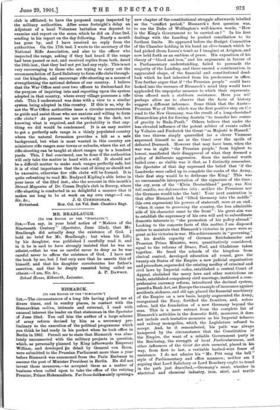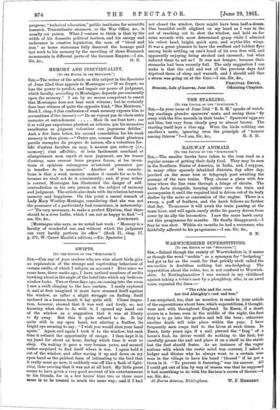BISMARCK.
ITO THE EDITOR OF ME "SPECTATORM Si,—The circumstances of a long life having placed me at divers times, and in sundry places, in contact with the Bismarckian milieu, intimate and external, I read with unusual interest the leader on that statesman in the Spectator of June 22nd. You call him the author of a large scheme of army reform devised by him as a necessary pre- liminary to the execution of the political programme which you think he had ready in his pocket when he took office in Berlin in 1862. Permit me to state that Bismarck was abso- lutely unconnected with the military projects in question, which, as personally planned by King (afterwards Emperor) William, and developed tin detail by General von Boon, were submitted to the Prussian Parliament more than a year before Bismarck was summoned from the Paris Embassy to assume the post of Minister President in Berlin. He did not invent those measures,—he accepted them as a matter of business when called upon to take the office of the retiring Premier, Prince Hohenzollern. Far from deliloerately opening a new chapter of the constitutional struggle afterwards labelled as the "conflict period," Bismarck's first question was, to use the Duke of Wellington's well-known words, "How is the King's Government to be carried on ? " In his first dealings with the Landtag he pushed conciliation to its furthest limits. He appeared before the Budget Committee of the Chamber holding in his hand an olive-branch which he had picked (from Laura's tomb as I imagine) at Avignon, and now held forth as an emblem of peace. His exposition of his theory of "blood and iron," and his arguments in favour of a Parliamentary understanding, failed to persuade the majority of the Landtag, and there ensued a continuation, in aggravated shape, of the financial and constitutional dead- lock which he had inherited from his predecessor in office. You further argue that if "the Prussian people" could have looked into the recesses of Bismarck's mind they would have applauded the unpopular measure to which their representa- tives offered such a stubborn resistance. Here you will perhaps allow me to observe that the facts of history suggest a different inference. Some think that the Austra- Prussian War of 1866, which was the first positive step on road to the New Germany, was the result of a long-cherished Bismarckian plot for forcing Austria "to transfer her centre of gravity to Buda-Pesth." Others believe that under the leas elevated influence of the potent arbiter of events called by Voltaire and Frederick the Great " sa Majeste he liasard," the two thieves simply quarrelled (as a clever Viennese expressed himself to me at the time) over the spoils of defeated Denmark. However that may have been, when the war was in sight "the Prussian people," from highest to lowest, manifested their disapproval of what they deemed a policy of deliberate aggression. Soon the national wrath boiled over : so visible was it that, as I distinctly remember, the Spectator of that day expressed the belief that 'if the Landwehr were called up to complete the ranks of the Army, their first step would be to dethrone the King.' This was no unreasonable interpretation of the signature of the time : the cry, even of the "Klein Deutschland" party, was Non. tali auxilio, nec defensoribus istis : neither the Prussians nor the Germans would take the bait ! Your next contention is that after Bismarck had "lifted Germany into the saddle" (his own expression) his powers of statecraft were at an end "when it came to governing the country, the less admirable side of his character came to the front " : his great aim was to establish the supremacy of his own will and to subordinate domestic interests to "the promotion of his policy abroad." Looking to the concrete facts of this matter, I am disposed rather to maintain that Bismarck's victories in peace were as great as his victories in war. His achievements in "governing," in his double capacity of German Reichskanzler and Prassian Prime Minister, were, quantitatively considered, equal to the reforms of Draco, Peel, and Gladstone taken together. He freed the schools of the kingdom from clerical control, developed education all round, gave the twenty-six States of the Empire a new judicial organisation and procedure, superseded the existing medley of criminal and civil laws by Imperial codes, established a central Court of Appeal, abolished the usury laws and other restrictions on trade, established compulsory civil marriage, instituted a com- prehensive currency reform, introduced the decimal system, passed a Bank Act, set Europe the example of insurance against accidents, sickness, and old age, placed the financial machinery of the Empire on a new basis, largely augmented the Army, reorganised the Navy, fortified the frontiers, and, nolens voices, laid the foundation of a new Germany beyond the seas. This is a mere extract from the complete list of Bismarck's activities in the domestic field ; moreover, it does not include such tentative measures as his Imperial tobacco and railway monopolies, which the Legislature refused to accept. And, be it remembered, his path was always hampered by the circumstance that the Constitution of the Empire, the want of a reliable Government party in the Reichstag, the strength of local Particularism.us, and other influences of the Geist der stets verneint, placed in his way, from first to last, a veritable barbed-wire fence of resistance. I do not admire his "Mr. Pitt rang the bell" style of Parliamentary and office manners ; neither am I arguing that Lord Salisbury or Lord Rosebery ought to tread in the path just described,—Germany's meat, whether in electrical and chemical industry, iron, steel, and textile progress, "technical education," public institutes for scientific research, Transatlantic steamers, or the War Office, &c., is usually our poison. What I venture to think is that by the width of his domestic political horizon, and his energy and endurance in creative legislation, the man of "blood and iron" as home statesman fully deserved the homage paid last week to his memory by the unveiling of three Bismarck monuments in different parts of the German Empire.—I am,





















































 Previous page
Previous page